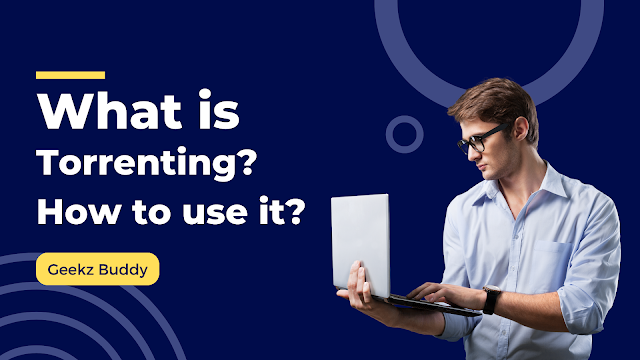Torrenting has become a buzzword in the digital world, offering users an efficient way to share and access a vast array of files. If you're new to the concept or want to explore it further, you've come to the right place. In this article, we will delve into the fascinating world of torrenting, covering everything from its definition to practical usage tips and common questions.
Table of Contents
What Is Torrenting and How Does It Work?
Understanding the Basics
Torrenting, often referred to as "downloading torrents," is a peer-to-peer (P2P) file-sharing protocol that enables users to distribute data across the internet efficiently. Unlike traditional file downloads from a single source, torrents rely on a decentralized network of users, making it a faster and more resilient method of sharing files.
How Torrenting Works
At its core, torrenting operates on the principle of breaking files into smaller chunks, called "pieces." These pieces are then distributed among a network of users who are downloading or uploading the same file. Each user, known as a "peer," contributes a portion of the file, creating a collective effort that speeds up downloads and reduces the strain on individual servers.
The Role of Torrent Clients
To engage in torrenting, you'll need a specialized software called a "torrent client." Popular options include BitTorrent, uTorrent, and qBittorrent. These clients manage the download and upload of torrent files, ensuring seamless sharing within the network.
Is Torrenting Legal?
Legal vs. Illegal Torrenting
The legality of torrenting largely depends on the content being shared and the jurisdiction you reside in. While torrenting itself is a legitimate technology, many users exploit it to share copyrighted material without authorization, leading to illegal torrenting activities.
Copyright Considerations
To stay on the right side of the law, ensure you only torrent content that you have the legal right to access. Downloading copyrighted material without permission can result in legal consequences. Always be mindful of copyright laws in your region.
How to Get Started with Torrenting
Choosing the Right Torrent Client
Selecting the appropriate torrent client is crucial for a smooth torrenting experience. Consider factors like user-friendliness, speed, and security features when making your choice.
Finding Torrent Files
Torrent files, often denoted with a ".torrent" extension, act as guides to the actual content. You can find them on various torrent websites, which host an extensive collection of files available for download.
Downloading Your First Torrent
Once you've chosen a torrent file, open it with your torrent client. The client will connect to other peers and start downloading the file. Be patient, as download times can vary depending on file size and the number of seeders (users who have the complete file) available.
How to Stay Safe While Torrenting
Protecting Your Identity and Privacy
Torrenting exposes your IP address to other users in the network. To maintain privacy and security, consider using a virtual private network (VPN) that hides your IP address and encrypts your internet connection.
Avoiding Malware and Fake Torrents
Not all torrents are safe. Some may contain malware or lead to fake websites. Stick to reputable torrent sources and always read comments and reviews to ensure the file is legitimate.
Torrenting Etiquette: Do's and Don'ts
Seeding and Sharing
Torrenting relies on the principle of sharing. Once you've downloaded a file, keep it in your client and share ("seed") it with others to maintain a healthy torrenting ecosystem.
Respecting Upload and Download Limits
Many internet service providers (ISPs) impose upload and download limits. Monitor your usage to avoid exceeding these limits, as it may lead to slower internet speeds or additional charges.
Contributing to the Torrenting Community
Consider contributing to the community by uploading quality torrents and adhering to best practices. This helps create a positive environment for all users.
The Benefits of Torrenting
Access to Vast Libraries of Content
Torrenting provides access to an extensive range of content, from movies and music to software and e-books. It's a treasure trove for those seeking diverse digital materials.
Faster Download Speeds
Due to its decentralized nature, torrenting often results in faster download speeds compared to traditional direct downloads. More peers mean quicker downloads.
Reduced Bandwidth Strain on Servers
Torrenting reduces the burden on centralized servers, making it an efficient way to distribute large files without overloading a single source.
Troubleshooting Common Torrenting Issues
Slow Download Speeds
If your download speed is sluggish, try connecting to torrents with more seeders, or check your internet connection for issues.
Incomplete Downloads
Incomplete downloads can be frustrating. Ensure you have enough storage space and that your client is properly configured.
Connection Problems
Troubleshoot connection issues by checking your firewall settings, ensuring your VPN is functioning correctly, and verifying port forwarding settings if necessary.
Frequently Asked Questions (FAQs)
What Is a Seeder and a Leecher?
Seeders are users who have downloaded the complete file and are sharing it with others. Leechers are those who are still downloading the file.
Is It Safe to Torrent Without a VPN?
Using a VPN is advisable to protect your privacy while torrenting. It adds an extra layer of security by concealing your IP address.
Can I Torrent on a Mobile Device?
Yes, there are mobile torrent clients available for both Android and iOS devices.
What Are Magnet Links?
Magnet links are a convenient way to start torrent downloads without downloading a separate torrent file. They contain all the information needed to initiate the download.
How Can I Find Torrents for Obscure Content?
Specialized torrent websites and forums cater to niche interests. These can be valuable resources for finding obscure content.
What Should I Do If I Receive a Copyright Notice?
If you receive a copyright notice, consider stopping torrenting the copyrighted material to avoid potential legal repercussions.
Conclusion
Embrace the world of torrenting responsibly and reap the benefits of faster downloads and access to a wealth of digital content. Remember to prioritize safety, respect the rules of the torrenting community, and stay informed about copyright laws in your region.

Post a Comment